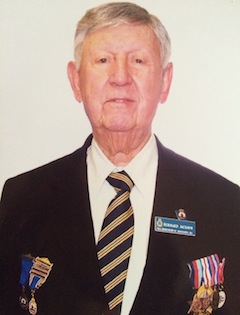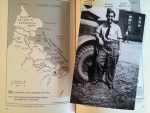Bernard Jackson joined the British Royal Air Force Volunteer Reserve in 1941, and landed on a Normandy beach on “D-Day plus one”: June 7, 1944. (photo by Shula Klinger)
Bernard Jackson joined the British Royal Air Force Volunteer Reserve in 1941. The Second World War was in its second year and the Luftwaffe was bombing the centre of London. With Erwin Rommel’s army on the march toward Alexandria, Jackson was equipped and trained for desert warfare in North Africa. The RAF’s plans changed, however, and Jackson was sent to Portsmouth to board a ship bound for France, as part of Operation Overlord. He landed on a Normandy beach on “D-Day plus one,” he said: June 7, 1944. Seventy years after the end of the war, in 2015, Jackson was awarded France’s Légion d’Honneur.
Jackson took an active role in the war, right from the first bombings during the Blitz. “Young as I was,” he said, he was a firewatcher on the rooftops near his workplace in Charing Cross, in central London. Gazing at the sky, a teenage Jackson observed “the RAF and the Germans fighting overhead. It was very interesting.”
With battle raging in the skies, below ground was a different story. “Most people went down into the subway. Everyone was friendly, they found things to do,” he said.
Jackson’s youthful fascination with the tools of the trade is still apparent. “We used stirrup pumps to put fires out, with water from a bucket. They were so ingenious. I often wondered what happened to those stirrup pumps.” He offered a useful tip: sand is actually more effective than water at putting out fires.
Jackson described civilian office workers picking their way through the flames, broken glass and shattered buildings after another nighttime bombing raid. Londoners must have been shocked, going to bed with an intact city and getting up amidst smoking ruins. “People get used to anything,” he said, speaking with the wisdom of experience.
Jackson’s vignettes of wartime military life are varied. Prior to D-Day, he was attached to the Navy for combined operations training, on a destroyer. He spoke enthusiastically about this 10-day period off the coast of England. He also served in the RAF Regiment, guarding airfields and anti-aircraft guns, in the event of enemy fire.
Recalling his June 7 arrival at Arromanches, Jackson described a “choppy” crossing. He saw “German soldiers, British wounded…. As far as the eye could see, there were tanks, landing craft, ships and battleships, and they’re firing over our heads. An incredible scene.”
Obstacles had been cleared from the beach by that point – the enemy had littered the beach with mines and “hedgehogs” (large constructions of iron and concrete) to slow down Allied progress, but the psychological impact of the battle was all too obvious in the men. They were “all grey and bent over, all weary – they were knocked out,” said Jackson. He describes reaching a pillbox (bunker) above the beach, “surrounded by dead German soldiers.” By the end of the landings, 156,000 men had been brought across the Channel. After one day of fighting, there were 10,000 casualties and 2,500 dead.
Raised in an observant Jewish home, Jackson became a bar mitzvah at a synagogue on Menetti Street, near Charing Cross. He was glad to find two other Jewish boys in his unit of more than 100 men. His stories, which are peppered with local details, often refer to their “mischief.”

Jackson recalled with a laugh, “never mind [Bernard] Montgomery [who forbade fraternization with locals], we’re living eight to a tent! I said to two or three of the boys, ‘France is known for its cheese, let’s see if we can get a decent meal.’” Off they went to the village of Arromanches, where they found a café managed by “Madame, on a high chair like a throne.” Having explained in “doggerel French” that they were hungry, the boys were served an omelette with crunchy bread, a delicious treat that was paid for with scrip, the money printed for servicemen to use overseas.
Having managed to wangle the use of a truck once a week, the lads went on excursions together, said Jackson. “Being the boys that we were, we wanted to go and look at a château, and we found one! So, we were walking up the path to the château and saw a big horse in a field. It was the summer, and it was an apple orchard. There’d been fighting through the orchard, so the apples were on the ground; it was awful, there was a plague of flies. We saw the horse go into the forest. It trod on a land mine. Blew itself up. We turned around and went back.”
Jackson also described the accommodations made by troops, who slept in muddy ditches, with no bathing facilities. They used dissected gasoline cans as washbasins; the water was contaminated with arsenic, which gave the men impetigo. Even with proper medical care, this condition is extremely painful – and these boys had no antibiotics.
In spite of the immense hunger and hardship, Jackson spoke of the warm hospitality of locals in the months after the war. While his unit was stationed in Louvain, just outside Brussels, they were “parked in a field for a good while.” He recalled an impromptu but hectic social scene, which led to numerous interesting conversations.
“Us three Jewish boys managed to pal up with a husband and wife who owned an apartment block. They rented out rooms. This Belgian couple had hidden in their rooftop attic a Jewish couple, husband and wife, for two years. Quite a few air force fellas used to go there.”
The end of the story is bittersweet. “There was also a Jewish doctor and his wife, they had a beautiful girl, 18 or 20, who’d been in a concentration camp,” he said. “One of the boys proposed to this girl and they were going to marry, but she died very suddenly. She had picked up something in the camp.”
Jackson spoke animatedly of the war machinery that made the landing possible. In particular, he recounted how temporary “Mulberry Harbors” allowed Allied troops and vehicles to land in occupied France when all of the ports were held by enemy forces. When he drove back to the scene in his brand new Austin 10, one year later, he was dismayed to find the pride of British engineering “in bits, laying all over the beach. It’s buried in the sand, all rusty. It’s a disgrace.”
The trip was worth it nonetheless, he qualified. He and his pals attended a French celebration to mark the end of the war, which he described as “marvelous, marvelous.”
It’s clear from Jackson’s stories that – in his words – he “left home a boy and came back a man.” In any conversation with a storyteller of his calibre, there are many golden moments. It’s as if the air almost crackles with the immediacy of his memories, the descriptions of the grey-faced survivors of the D-Day landing, or his helpful instructions on how to boil water in a discarded German helmet. Quite apart from his resilient spirit and natural leadership, his candor is impressive. Speaking about such events – even 70 years later – can be difficult for many war veterans, not to mention that he actually went back only a year later.
“It’s a traumatic experience in many cases,” he said of why many people do not like to talk about their experiences in the war, or go back to where it took place. “I never talked about it to my children because, you see, my generation came out of the war saying there’ll never be another war after this one.” In other words, the information may have seemed redundant. But, Jackson added, “Look where we are today. It’s something in the human psyche. It’s greed. It’s power politics.”
Speaking to Jackson is a tremendous privilege; his vignettes of wartime – and postwar – Europe reveal a society in turmoil, where looting was common. He offered accounts of Russian dancing and vodka, gunfire and generosity, stolen yachts and black market cigarettes, hardship and hospitality.
Jackson is an astute observer of humankind and its many failings. But, as well as the stark and troubling stories, he has tales of compassion, generosity and the universal nature of the human experience. “People forget,” he said, “how the French suffered, on top of being occupied. They were short of food, coffee was unheard of, they hadn’t seen it in a long time – they used grass with acorns to give it body. They had no clothes; they stripped the dead for their clothes, even German soldiers, they just stripped off the epaulettes.”
Speaking of the Russian prisoners of war who insisted on sharing their meagre, greasy meals with Jackson and his comrades, he said, “They put dances on for us, someone played the accordion and they did these Russian dances.”
From peasants who could neither read nor write to highly educated ballet dancers or leading aircraft men like himself, Jackson said he realized, “they’re just like you, just like everyone else.”
Shula Klinger is an author, illustrator and journalist living in North Vancouver. Find out more at niftyscissors.com.



